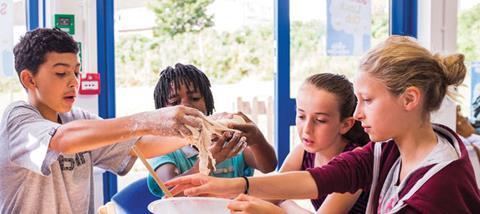
3.5 million children is just the tip of the iceberg, representing families who are struggling with debt, unemployment, addiction... the list is long. There’s no one simple problem here, nor one single reason for all these instances of child poverty, and no simple solution.
Once I’d watched the programme I couldn’t just sit back and do nothing. The children in the programme talked about how much they value free school meals (FSM) and how much harder the school holidays are without them. It suddenly seemed like an obvious thing that churches could do to help. Six weeks after the documentary was shown, the first Lunch kitchen opened in Corby. That summer we served 300 meals in Corby, Luton and Middlesbrough; MakeLunch had begun.
How to make lunch:
Of the 7 million schoolchildren in the UK, 1.2 million of them are eligible for and receiving free school meals (not including all the pupils in KS1 who now receive them under the new universal infant FSM programme). That’s 18 per cent of primary pupils and 16.5 per cent of secondary.
36 per cent of pupils on FSM get 5 A*-C grades at GCSE compared to 64 per cent among their non-FSM peers.
You can find out how many people in your area are eligible for free school meals on the Ofsted website.
Providing lunch for families helps improve children’s physical and dental health, social confidence and emotional wellbeing, and also helps maintain their academic standards while schools are closed.
Running MakeLunch is easy and we’re here to help – contact us to find out about training and resources.
How MakeLunch has grown:
2011: 300 meals, 3 locations
2012: 1,500 meals, 15 locations
2013: 5,986 meals, 27 locations
2014: 8,388 meals, 33 locations so far….
MakeLunch is based in local churches. The churches work in partnerships with the schools in their community to identify families in particular need. It might be that they rely on free school meals during term time, so MakeLunch continues that essential provision. Other families survive on an extremely low income and appreciate the financial relief that the MakeLunch meals offer. MakeLunch is all about providing a little bit of relief for low income families in the UK. We do this by providing meals during school holidays – filling the holiday hunger gap.
Nicki’s story
Nicki became a single mum after her marriage broke down and she was left to care for Annie (14) and Dylan (8) while also having to earn enough to cover the mortgage. A local childminder gave her a few hours work per week and she registered for income support. Receiving this benefit meant that her children became eligible for free school meals.
The MakeLunch project in Dorchester helped reduce the family’s food bill over the six-week summer holiday. The children made friends at Lunch and enjoyed playing with them each day, often going on to a local park or to the beach afterwards.
Nicki heard about the Dorchester Lunch Kitchen when her son was invited through his school. After the first few days, she realised how important it was and invited friends who she knew would appreciate similar support. Some of Nicki’s friends are two-parent families who are in even greater financial need than she is – if both parents are working, the benefit entitlements are greatly reduced.
Nicki recently started a child-minding business of her own, allowing her to work hours that fit around school times and she has lost her benefits entitlement. At first, this left her financially worse off than before, earning less each month than she was receiving on income support. Now that her business is becoming more established, things are starting to improve and she is a little better off each month.











































